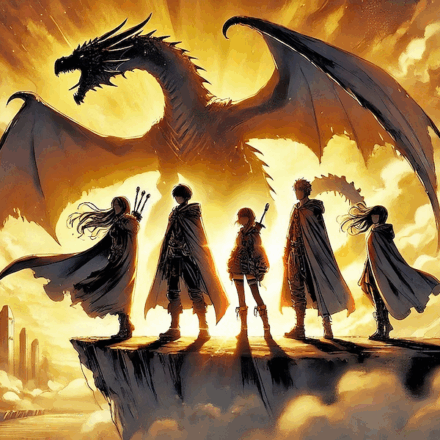I’ve read a number of interesting posts this week about Mass Effect 3, how very right it got its gameplay–and how its ending just didn’t match. Shamus Young, who used to write DM of the Rings, wrote a few posts analyzing issues from the game’s ending. If you’re playing the game, the next linked post leads to posts with massive spoilers. Click carefully.
In Mass Effect 3 Ending Controversy, he suggests that there are three things that people expect from endings–not all three from every story, but most endings deliver at least one of these elements. His three elements are: Affirmation, Explanation, and Closure. One point made in the linked post is that as you increase investment–the time spent playing a story–the more that story-loving people expect at least one of the story closure elements. A short story–or a single session–makes it easier to shrug and accept the story as a slice of life, aka “random stuff happens”. Once a tale becomes epic, people expect an ending to match.
Roleplaying games aren’t written by one person, so planning a perfect ending before the game begins is futile. You might wind up spending your whole campaign straining to keep the characters on the tracks–and burn out their enthusiasm, due to lack of choice, before the ending ever arrives. A better skill is creating meaningful decisions, and following decisions to outcomes. (There’s an art to it–read Phil’s article to develop Structured Unstructuredness.)
That said, when your game starts approaching its conclusion, you need to start planning out which story elements you’re going to offer. Because this is a roleplaying game instead of an authored story, you can only provide a chance to engage–you’re not force feeding them closure, or promising an affirming ending. They still have to fight the final battle–there’s no cut scene just as things get interesting.
Affirmation
Building an affirmative ending requires you to amplify or reinforce what’s come before. If the heroes have been fighting a guerrilla war, they have an opportunity to take an even greater risk–one that might end the war in one desperate gamble. Or the PCs discover that the ambassador has not been negotiating in good faith; if they decide to assassinate her to stop her evil plot, they may pay a terrible personal price, but the scheme will fall apart without her guidance.
Martin talks about building a strong, planned ending in his article Ending a Campaign: Taking My Own Advice. You can see how he executed the ending in his follow-up article, With a Bang: Ending a Campaign on Purpose.
Explanation
Win or lose, it’s often great just to learn what made the world work the way it did. While you can sometimes cover the information out of game, it’s almost invariably better to reveal cause and effect in game. Walt discusses the pros and cons of explaining the game as a conversation in How to End a Campaign Early.
As the GM, it’s exciting to show off the coherence of the story, demonstrating that the plot hangs together and your villain follows a twisted but coherent logic. This ending element has ties to your world building and plot design skills. Players might be fascinated by those details too, it often depends on how invested they got in the wider world. A narrow focus on the PCs and their actions can limit the context of the story–and the excitement they derive from understanding how it all came to be. Building interest in the story’s Why? and What happens next? needs to be steady throughout the campaign to make this an anticipated part of the conclusion.
Closure
Finding out how things resolve is another great reward. Too often this gets truncated; the last battle of the final session runs long, leaving everyone too exhausted to play through the scenes that wrap everything up. Martin’s article, Closure: What Separates an Amazing Campaign from a Great Campaign, rams home the point that good stories need an end.
“And they lived happily ever after” doesn’t answer what happened in detail, but it makes what went before feel like a complete story. Sometimes those dangling threads are where the next story starts, as in The Stepsister Scheme. The story’s impact, and how it will affect characters great and small, makes the story feel rewarding.
[Late Edit: For more detail, including spoilers, on the Mass Effect 3 ending problems, Doyce’s post was heavily on my mind while writing the above.]
Your Campaign
You have three elements that players will expect from your campaign’s conclusion. Which elements do you always include when you’re the GM? When you are a player, do you want to understand the villain’s logic? Do you only care about what happens to your own hero once the curtain comes down? Which elements are most rewarding to you at the end of a good campaign?

















Hmm…lots to think about in this one. Nice job.
I’m preparing to wrap up my current campaign in a month or two and I’ve been thinking about the Mass Effect 3 ending controversy, trying to make sure I don’t botch a great experience with a bad ending. Paying attention to the affirmation and explanation is something I’m going to have to look into more now. I think I might even do a slideshow/ending credits explaining how the PCs actions affected the world at large. That might help affirm their choices and make sure that anything that didn’t come up in the final few sessions got explained.
Oh, yeah, I’m running the ending session of a game tomorrow! Actually, the end of the first “season” of a game, which will resume after I take the rotating GM chair again.
Good stuff, and I had forgotten about the Stepsister scheme, I loved that book!
@Roxysteve – Thank you! Jennifer loves ME1 and 2… I wonder if I should let her play 3, but make the disk conveniently disappear when the end approaches.
@John Arcadian – I like the idea of the slideshow–it might be a great way to provide explanation while reflecting their choices.
I hate the idea of lots of great gaming being judged by just the last session, but the beginning and end are what everyone’s tales of the campaign concentrate on.
@Lee Hanna – Good luck with your season’s conclusion. Knock their socks off!
I’ve reached the end of far too many computer and console games only to be disappointed with the outcome. I usually feel like there was a lot more pizazz that could have been added on, especially when one spends 60 hours or more to get there.
I strive not to have it happen in tabletop, but I am sure that it has happened from time to time.